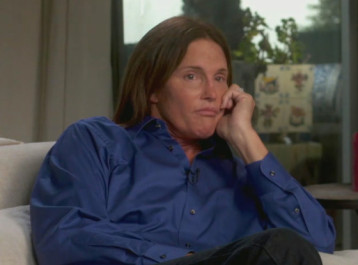“True bravery is shown by performing without witness what one might be capable of doing before all the world,” said a wise man named La Rochefoucauld, centuries ago. That man’s definition excludes most of America’s contemporary heroes.
La Rochefoucauld’s understanding of courage certainly rules out most black community leaders. In Baltimore, a city devastated by anti-police, race rioters, these “leaders” made sure they were seen calling for calm following the orgy of destruction. Away from the cameras, their lives have been given over to causing chaos by preaching racial grievance against white America.
The same imperative of privacy and consistency precludes Bruce Jenner.
The famous Olympian athlete turned TV personality has come out very publicly as a transsexual, who is in the process of transitioning to full womanhood; Jenner already has the psyche of a woman. For providing 17 million ABC viewers with a glimpse into his very real inner struggle with sexual identity, Jenner has been hailed as an American hero.
Coming out simultaneously as a Republican and a Christian failed to dampen the admiration with which the oppressed patriarch of the Kardashian clan was greeted—Jenner has been embroiled in a vulgar reality show, Keeping Up With the Kardashians, on which he is generally belittled and berated.
The political and religious identities of Republicanism and Christianity are mortal sins in the eyes of Jenner’s celebrity peers and the audience to which he appeals. Granted, Republicanism is so meaningless a political identity that a Democrat can just as easily transition to being one, without much pain. Christianity, however, is supposed to set a higher bar for belonging. In the Kardashian clan, Jenner is rudderless dad to a bevy of catty exhibitionists. And he is ex-husband to the mercenary, mean, ball-busting matriarch, Kris Kardashian. Kris is madam to these media whores.
Is this what a man of faith looks like, these days?
This is not to diminish Jenner’s excruciatingly difficult journey. However, a stoic Olympian battling his demons in private would have more closely approximated the qualities of a hero.
Still, Jenner is more of an American hero than the late Navy SEAL Chris Kyle. Kyle “held the record for number of kills by an American sniper. The Pentagon confirmed more than 150 of his kills. The previous record was 109.” Kyle lived by the sword and died by the sword. In 2013, he was “shot point-blank” by another veteran.
It is hardly an accomplishment to have killed so many individuals in the service of Uncle Sam. This Navy SEAL was like a real-life Jack Bauer, the character from the hit TV series 24: a federal government zombie in thrall to the state and trained to do its bidding.
To be sure, Kyle had the makings of a hero in the classical, Homeric mold. To follow the criteria outlined by the Fellowship of Reason, Kyle performed “extraordinary feats.” But for a fatal flaw, he was of “noble character.” As a masculine force at full tilt, his suffering was great and his death unusual. Kyle’s fatal flaw was to have slavishly toiled as an assassin for the Federal Frankenstein.
For reasons mysterious, America’s anointed heroes are either killing people in faraway lands, or crying on television here at home. The key to glory is to go public.
A British newspaper, the MailOnline, did its part in stripping heroism of meaning, literally. The paper ran a pictorial that depicted, to quote, “brave mothers and daughters baring all—and revealing their hopes and fears about ageing.” To get naked for the world to see is immodest, not heroic. Displaying “saggy tummies” and “stretch marks” does not a hero make. Narcissism, self-adoration, bad taste, or just being comfortable in your own skin: these are not heroic, although they’ve been cast as such.
As their ideal, the aforementioned Fellowship of Reason hearkens to “the classic Aristotelian model of virtue as an expression of good habits developed purposively over time and maintained by thoughtful practice. This is coupled with an unabashed enthusiasm for the kind of individualism advocated first by the Enlightenment and put into practice by the romantic post rationalists of the Industrial Revolution.”
The “hero” adulated in the United States today is a deformed version of the Romantic-era hero: The battle that informs his life is “the courage to be me.” He makes up his own moral code. He is a slave to his passions and exercises no discernible control over them. Besides fame, his goal is self-knowledge, a goal limited by his profound superficiality, deep ignorance, and lack of learning. His loyalty is not to higher, timeless principles, but “to a particular project and to a community of like-minded others.” The transgendered community, in Jenner’s case.
Bruce Jenner says his gender identity is female and so is his pattern of sexual attraction. The two—gender identity and sexual attraction—are separate things. Jenner has always loved women and likely will continue to so do. Now that is heroic, given the shallow, plastic, silicone-stuffed, crass, nasty women with whom poor Bruce has been surrounded.
Ilana Mercer is a paleolibertarian writer, based in the U.S. She is a contributor to Junge Freiheit, Germany’s finest weekly, and is a fellow at the Jerusalem Institute for Market Studies. Her latest book is “Into the Cannibal’s Pot: Lessons For America From Post-Apartheid South Africa.” Her website is www.IlanaMercer.com. Follow her on Twitter. “Friend” her on Facebook.


